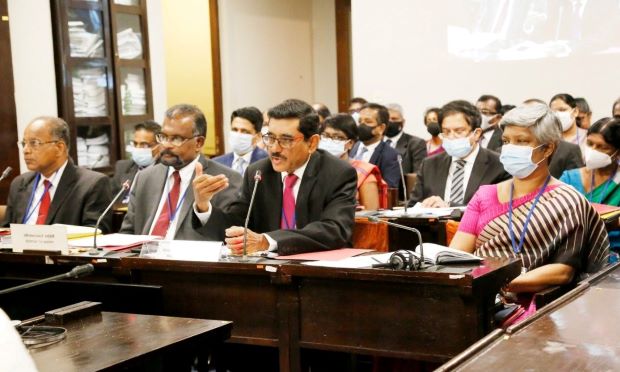Govt. ignored IMF 2020 warning that debt was unsustainable, COPE told
COLOMBO – Sri Lanka was told that debt was unsustainable in the view of the International Monetary Fund (IMF) in 2020, but the warning was ignored, Parliament’s Committee on Public Enterprises (COPE) heard on Wednesday (25).
Sri Lanka sought a Rapid Finance Instrument (RFI) facility in 2020 at the start of the COVID-19 pandemic shortly after the government had cut taxes in a bid to close an ‘output gap’ sharply reducing tax revenue.
Then large volumes of money were injected to the banking sector and price controls were placed on bond auctions to prevent private savings from being channelled to the fill the budget gap, while liquidity injection created a balance of payments deficit.
“At the time the RFI request was made by the finance minister, I as Deputy Governor led the technical level discussions,” Central Bank Governor Dr Nandalal Weerasinghe said responding to a question by COPE Chairman Charitha Herath.
“The IMF did a debt sustainability analysis and came to a conclusion that the debt was not sustainable for the next five years,” he said, explaining, that the IMF had proposed financial advisers be appointed to make debt sustainable and the proposal had been conveyed at the high level, a director level, as well as president and president secretary levels.
He also noted that under IMF rules an emergency loan cannot be given to a member country if the debt is not sustainable.
When question as to whether that view conveyed, Weerasinghe affirmed the view was clearly conveyed, and added that fter technical discussion both parties had agreed the path to be taken over the next five years would be on the debt sustainability analysis.
When questioned whether it was conveyed to the Central Bank Governor, Weerasinghe said the Governor at the time was informed, but noted that it was the president’s secretary who mainly took decisions at the time, and the decision made at the time had been, “we will not re-structure debt at any time”.
Questioned as to whether the president’s secretary was making decision on behalf of the financial secretary, Weerasinghe said the high level discussion with the IMF director had taken place with the president’s secretary. “The decision was made that the debt will not be re-structured and we can manage the situation. The discussions (with IMF) then ended,” he added.
About a year later in March 2021, IMF spokesman Gerry Rice confirmed that the RFI talks fell through due to debt sustainability. “We did receive a request (in April 2020) from the Sri Lankan authorities for emergency financial support to help fight the COVID pandemic,” Rice said, noting that the assessment of that support had taken longer than for other countries due to Sri Lanka’s daunting economic challenges and high public debt.
“So we have sought, but not reached understanding, on how to fulfil the key requirements for what could be a rapid financing instrument which would include policies to continue ensuring debt sustainability to address the balance of payment challenges including from the COVID-19 impact on tourism and to preserve international reserves.
“Indeed, Sri Lanka has relied on import restrictions since last year and recently introduced additional measures such as a requirement to convert 25%of export proceeds,” he said adding “We continue to closely monitor these economic policy financial developments in Sri Lanka including the recent agreement on a swap line with the People’s Bank of China.”
-economynext.com/ENCL


